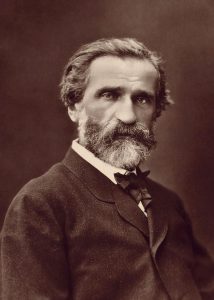
We begin by picking up where we left off last week, with the triumphant premiere of Verdi’s Requiem for Manzoni in 1874. Verdi proceeded to tour Europe conducting the Requiem to ecstatic audience responses everywhere. He was truly at the very top of his game, in his absolute prime. Consequently, it came as a thunderbolt when, in late 1875 (or so), the 62-year-old Verdi did the unthinkable: he informed his nearest and dearest – his wife, his friends, and his publisher – that as a composer he was through, finito. After 24 operas and one Requiem, after a lifetime of 16 to 18-hour days, impossible deadlines, harried constantly by librettists, producers, singers, critics and conductors, Giuseppe Fortunino Francesco Verdi was done. When his great friend Clarina Maffei told him that he had a moral obligation to compose, Verdi wrote:
“Are you serious about my moral obligation to compose? No, you’re joking, since you know as well as I that the account is settled.”
He had been thinking about retiring for decades. In 1845 – at the age of just 32 – he was retirement was already on his mind. He wrote to a friend:
“Thanks for remembering poor me, condemned to continually scribbling notes. God save the ears of every good Christian from having to listen to them! [You ask] how I am, physically and spiritually? Physically I am well, but my mind is black, always black, and will be so until I have finished with this career that I hate.”
But it wasn’t until 1876 that he hung up his spurs and decamped to his estate in Busseto, in north-central Italy. To another friend he wrote:
“Now that I am not manufacturing any more notes, I am planting cabbages and beans, etc., but since this work is no longer enough to keep me busy, I have begun to hunt!!!! That means that when I see a bird, punf! I shoot it; if I hit it, fine; if I don’t hit it, [fine].”
No one was happy about Verdi’s retirement except Verdi.…… continue reading, only on Patreon!
